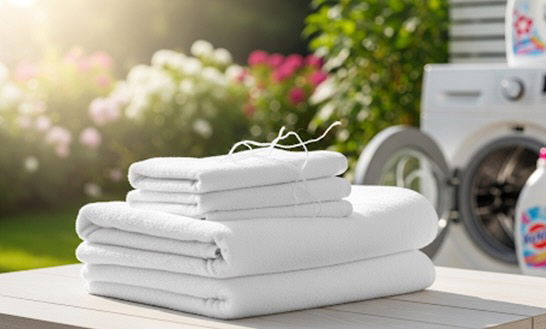This is how I solve the stale smell from the laundry
|
In-between seasons, even if the humidity is not as high as during the rainy season, it is easy to leave the smell of laundry due to the temperature difference in the morning and evening and the lack of ventilation. If your clothes smell heavy no matter how much you turn the washing machine, you should find the underlying cause and change your washing habits. From now on, I will introduce practical laundry know-how that can be used in late summer and early autumn.
You have to start with cleaning the washing machine
The most common cause of laundry odor comes from the inside of the washing machine, not from the fabric. Detergent residue, mold, and bacteria left in the laundry tank are soaked in clothes to create a stale smell. It is necessary to use a washing tub cleaner or run a high-temperature sterilization course to clean the interior once a month. Cleaning the washing machine well reduces half of the odor causes.
The laundry must be taken out immediately after washing
If you leave your washed clothes as they are, germs will grow quickly while wet. Especially in humid weather in late summer and early autumn, the speed becomes faster. When washing is completed, the clothes should be taken out and dried within 10 minutes as much as possible so that the clothes do not smell.
I use vinegar instead of fabric softener
Textile softener scents can be mixed rather unpleasantly in soggy weather in summer. At this time, adding one or two spoons of vinegar to the last rinsing stage is effective in suppressing bacterial growth and reducing odors. You don't have to worry because there's no vinegar scent left after washing.
get rid of germs by washing them with hot water
Clothing that directly touches the skin, such as towels and underwear, is suitable for high-temperature washing. Washing with water above 60 degrees almost removes germs, and the cause of odor also disappears. However, depending on the material, high-temperature washing can lead to damage, so make sure to check the clothing label.
The amount of laundry should be kept moderate
If you fill up the washing machine, the detergent will not be released enough, and the rinsing will be incomplete, which can make the smell worse. It is recommended to keep the amount turned at a time within 70% of the washing tub capacity. Water and detergent spread evenly when there is room for extra space, increasing the washing effect.
Drying should be done quickly and reliably
At this time, it is easy to leave laundry half-dry for a long time because of the difference in humidity and temperature. However, if moisture remains, fungi and bacteria reproduce and smell again. It is important to dry it as soon as possible using a sunlit area, dryer, or dehumidifier. It is also a good idea to use a fan in a well-ventilated place.
Finish with ironing after washing
Steam ironing even after clothes or towels are completely dried can remove bacteria that may remain. In particular, fibers that are easily smelly, such as towels and underwear, remain dry for a long time when ironing is completed. Ironing has a hygienic effect more than just organizing the shape.
Making a unique odor management habit during the change of seasons
In early autumn, temperatures often fall, reducing indoor ventilation. However, ventilation is essential to reduce the smell of laundry. It is also helpful to briefly open the window to circulate air when fine dust is low during the day, and to put a dehumidifying agent in a laundry room or drying space. Small ventilation habits alone can prevent soggy odors.
The problem of the smell of laundry in late summer and early autumn can be sufficiently solved without the use of special detergents. If you keep small habits such as washing machine cleaning, maintaining proper amount of washing, quick drying and ironing, you can meet dry laundry every day. As the seasons change, careful management is needed. Just like how you feel when you roll up your sun-dried laundry, one little know-how protects your daily comfort.
This article was translated by Naver AI translator.




